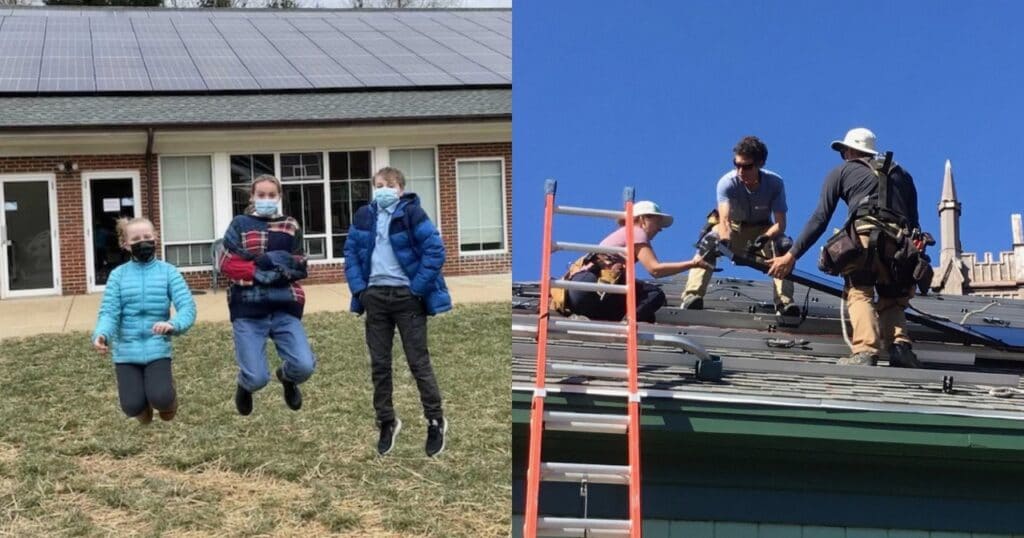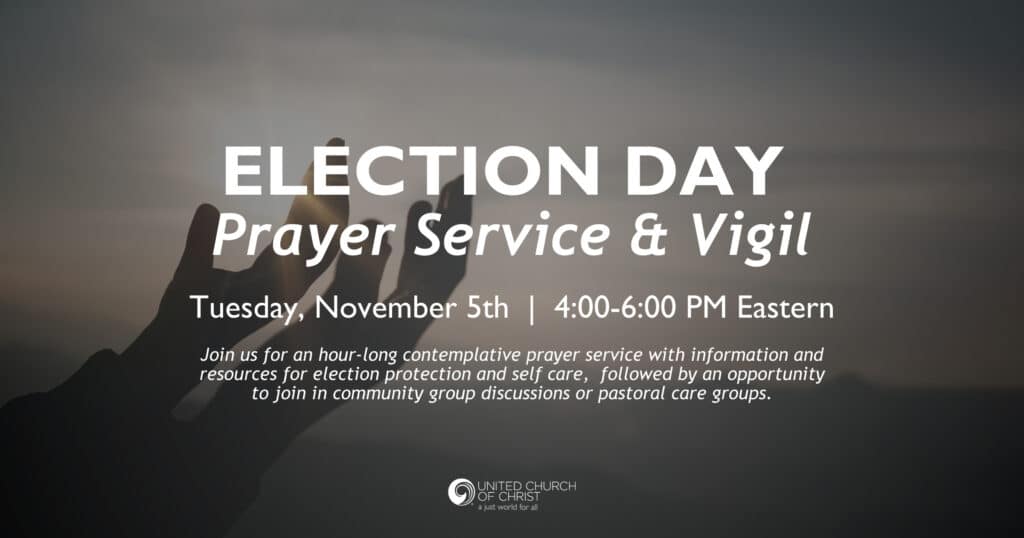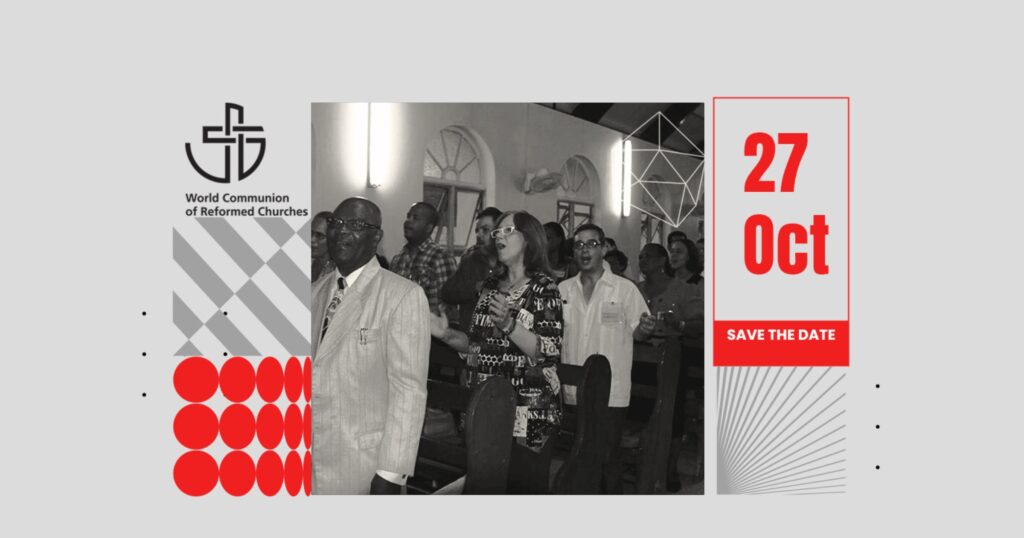Two UCC churches take ‘Cool Congregations’ awards in 2022
Every year, Interfaith Power and Light celebrates a few ‘Cool Congregations’ – churches taking tangible steps to tread lightly on the earth by reducing their carbon footprint. This year, two of those six award winners are United Church of Christ churches.
Rock Spring Congregational United Church of Christ, Arlington, Va., is the 2022 Energy Saver award winner. The Neighborhood United Church of Christ, Bath, Maine, won the 2022 Community Inspiration award.
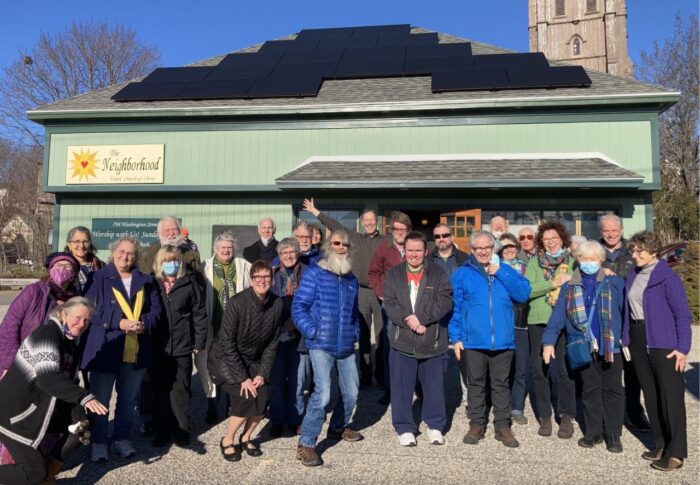
“The people of The Neighborhood UCC are so grateful to receive this award. We are a congregation that embraces the belief that we see Jesus in all of our neighbors and in all of creation,” said the Rev. Holly Reid, its co-pastor. “Climate change will bring suffering to all of creation. We believe it is the role of faith communities to provide hope by demonstrating how we can live differently.”
The Neighborhood UCC, selected for being persistent — undeterred by financial and city code constraints — was named the 2022 Community Inspiration Winner — Solar Step by Step. It persuaded the city to update its code to allow solar installations in the community’s historic district.
Rock Spring UCC was honored for its work to become a net-zero congregation, collecting the 2022 Energy Saver Winner — Net Zero Project: Leading by Example. The church was also lauded for leading by example, through mission work and educational outreach to members and the wider community.
Each step ‘a sign of hope’
Listening to the science and leading by example is important to both churches.
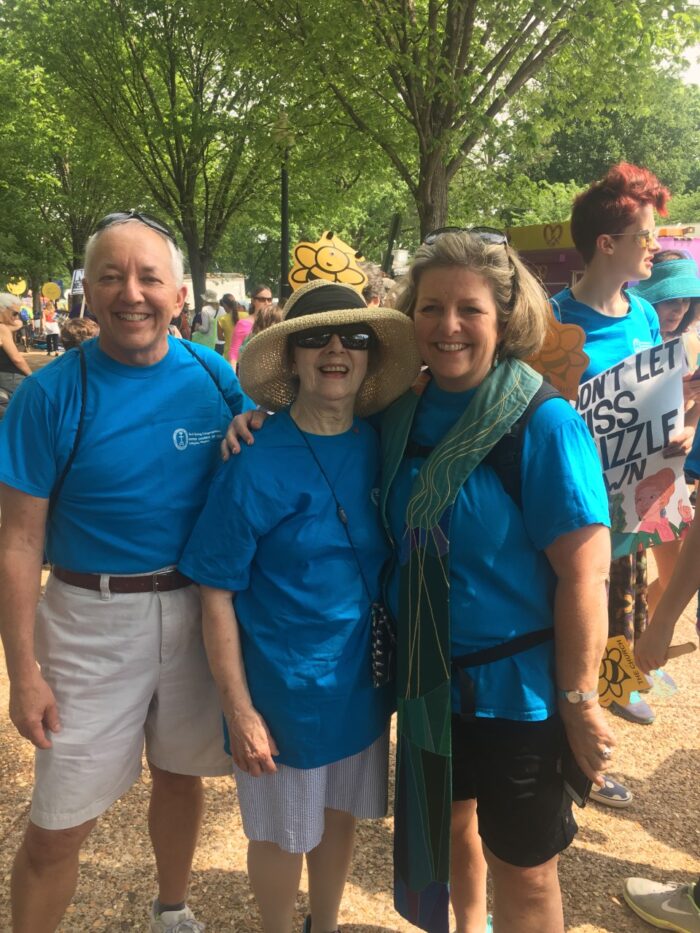
“One congregation can’t solve all of the problems of the world, but each step makes a difference and is a sign of hope and healing,” said the Rev. Kathy Dwyer, Rock Spring UCC’s senior pastor.
“It has been energizing for our congregation to be able to engage in a project that has meaningful impact. The dire news about the climate coming out of the U.N. makes the need for this action all the more important. We hope other congregations will make the same commitment.”
Winners of the Cool Congregations Challenge are selected annually from five categories: Energy Saver, Renewable Role Model, Sacred Grounds, Community Inspiration, and Cool Planner. This year, an Electric Vehicle category was added.
Energy audit
Rock Spring has been working on a commitment to conserve energy for several years, purchasing green energy, converting light fixtures and upgrading the HVAC systems in a campus that’s almost 33,000 square feet. But as member Carolyn Rapp wrote about the process, “as the climate crisis accelerated, we agreed we had to take bolder action.”
The church did an energy audit. It found a lot of wasted energy, accounting for 70 percent of its annual utility costs.
“We found that we were spending about $37,000 a year on inefficiencies — heating and cooling the outside due to poor insulation, for example,” said the Rev. Laura Martin, associate pastor. “It actually costs less to invest in these green upgrades over 20 years than to keep paying the rising energy costs for the way that things had been.”
The church installed insulation, upgraded windows and purchased a solar power array, after re-roofing the building on which it went up.
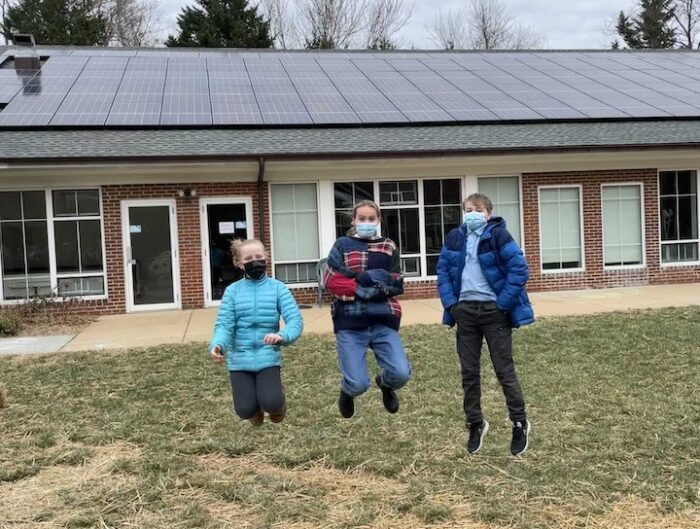
Small steps
But as Martin and member John Overholt said, initial small steps also have a big impact.
“Look for things that would have a quick payback — high savings at lower costs,” Overholt said. “Look first at lights that are on most of the time. Generic LED bulbs cost close to the same as old-fashioned bulbs, and will use one-sixth the electricity for same amount of light. Replacing incandescent exit signs with new LED fixtures can pay off in less than a year. Storm windows can save energy in cooler climates, and won’t go foggy after 20 years like replacement double-pane windows. Door sweeps on outside doors can reduce drafts coming in under the door. Insulate hot water and all heating pipes to improve efficiency in heat transfer. Same holds for heating ducts, particularly through unheated areas.”
Rock Spring has been responding to climate change in other ways for decades, which include joining marches and sharing messages from the pulpit. In addition to the energy-saving building upgrades, congregants have planted trees and native plants on campus and created a “Plot Against Hunger” garden. Last year they donated more than 9,000 pounds of fresh produce to local food banks.
The sweeping changes made by the church have not gone unnoticed. Rapp noted that they’ve offered other congregations information on what they’ve learned about reaching net-zero. Martin said a reporter from Energy News Now visited the church for a walk-through last Sunday.
Solar strategy
“Climate change is such a huge problem, it is easy to feel overwhelmed,” said Reid. “At The Neighborhood, we have tried to celebrate all of our small successes as tangible things we can do individually that will collectively make a significant difference.”
The Maine congregation decided to reduce its use of fossil fuels in 2017 after it sold its sanctuary building and bought a small restaurant downtown — to gain a commercial kitchen to continue its mission to feed the food-insecure.
Church leaders, looking at the new building’s south-facing orientation, decided to go solar. They faced a number of challenges. The roof leaked, the building needed insulation and other improvements were needed for energy efficiency — and the budget was tight.
“We started small,” Reid said. “We had a team come and give us some ideas of how we could make our space more energy-efficient. [For] some of the projects we only needed to afford supplies, and volunteers from the congregation did the work.
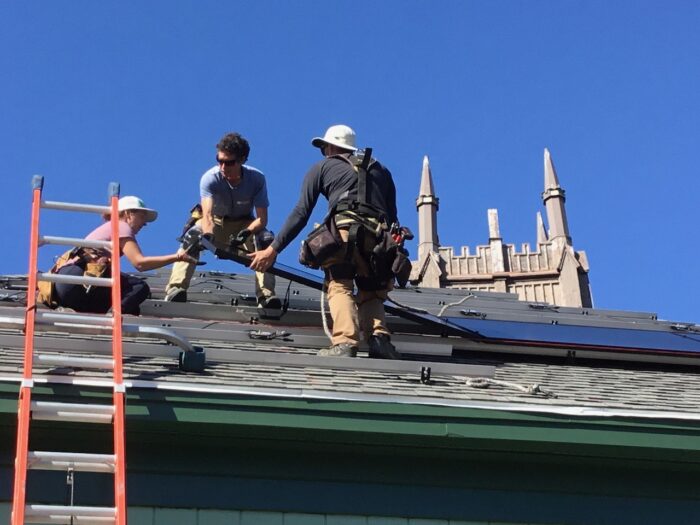
“Obtaining the solar panels was a bigger investment and required that we find lenders. We were able to find four private community investors who believed in the project and were willing to invest.” Three of the lenders belong to the church; the other is a relative of a member.
Zoning code problems
But after the project financing was figured out, The Neighborhood solar team member Sam Saltonstall said they ran into a bigger challenge. “We discovered that the land-use code forbade solar visible from the street within the historic district where we were located,” he said. “We would have to get the code changed to realize our goal.”
The church’s solar team had to try a few times to get a zoning code amendment through city council – but they were able to successfully switch on their system last September.
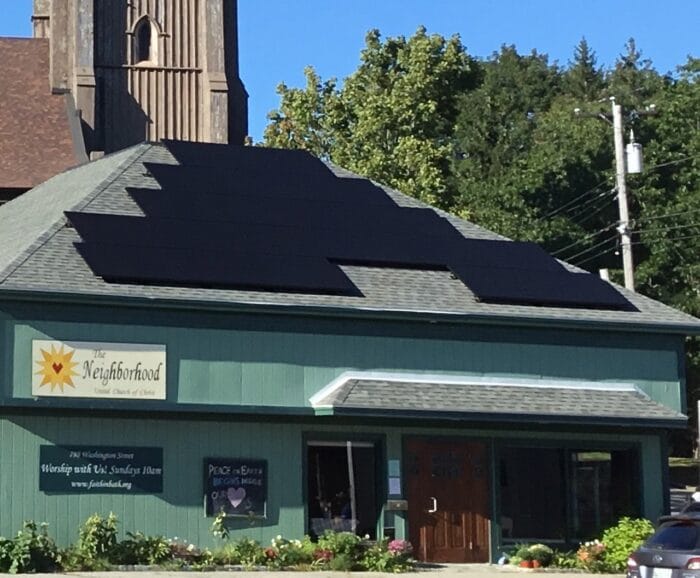
“Meanwhile, the change in the land-use code makes it possible for others within the historic district to install properly sited solar arrays visible from the street,” Saltonstall said. “Without the initiative we took, this would not be possible. We had persuaded the City Council to not only treasure Bath’s past but to also support its clean-energy future in a very specific way.”
The Neighborhood also offered a free educational series to community members on Zoom, “to address ways to make our dwellings more energy efficient and less fossil fuel dependent,” Reid said.
“One of the main lessons we learned from this effort is that when the savings from a solar project help to pay off the loans which are used to finance a portion of it, you can reduce your fossil fuel use quickly,” Saltonstall said. “With the spike in energy costs nationally even before the Ukraine war began, doing solar is not only the right thing to do from a moral standpoint, it is also an eminently sensible thing to do from a financial standpoint.”
‘Huge future savings’
The Cool Congregations winner in each of the six categories collects $1,500, with $500 awarded to 12 runner-ups — two in each category.
Martin said Rock Spring plans to use its award to offset some of the cost of becoming “net zero.” The church’s Phase One costs for insulation and solar topped $405,000.
“We believe that this large up-front investment will lead to huge future savings,” Rapp said. “The $37,000 annual pre-COVID utility costs could decrease as much as 75 to 80 percent. Our predictions are based on overall trends, so these are estimates. But without doubt, our energy savings and carbon footprint reduction will be enormous.”
The members of The Neighborhood UCC plan to use their winnings for further improvements.
“We had an open meeting after church to discuss the possibilities of what to do with our award,” Reid said. “We have a vision of turning our parking lot into a green space. Our goal is to remake our barren parking lot into a welcoming space for native species. This idea has much enthusiasm in our community and we have decided to use the Cool Congregations Community Inspiration award as seed money for this project.”
Content on ucc.org is copyrighted by the National Setting of the United Church of Christ and may be only shared according to the guidelines outlined here.
Related News
UCC to offer Election Day Prayer Service and Vigil
On Election Day, Nov. 5, join the Rev. Karen Georgia A. Thompson together with United Church...
Read MoreGoing beyond the blessing: Churches emulate St. Francis’ care for animals
https://www.youtube.com/watch?v=lu3LYwhLxCo UCC News presents a video news story on the...
Read MoreUCC leaders invite all to global celebration of Reformation Sunday
This Reformation Sunday, leaders from the United Church of Christ will participate in a global...
Read More